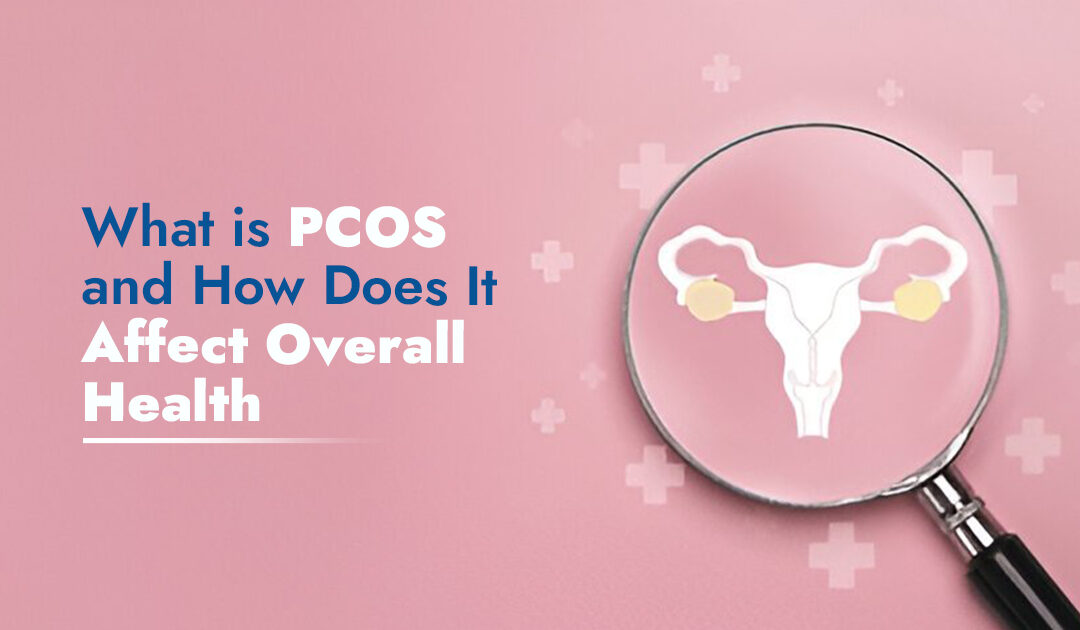PCOS, also known as polycystic ovarian syndrome, is a common hormonal disorder. It results in infertility, excessive hair growth, irregular menstrual cycles, and acne. The course of treatment for PCOS is determined by your desire to conceive. If you have PCOS you may also have an increased risk of developing diabetes and high blood pressure. PCOS is one of the leading causes of infertility, but if you wish to try for a child, your gynecologist can treat your PCOS based on your symptoms.
Your ovaries create androgens (male hormones) in abnormally high amounts if you have PCOS. Your reproductive hormones fall out of balance as a result. Consequently, irregular menstrual cycles, missing periods, and uncertain ovulation are common in PCOS patients. Anovulation, or the absence of ovulation, can cause small follicular cysts, fluid-filled sacs containing immature eggs, to appear on your ovaries during ultrasonography. Nevertheless, despite the term “polycystic,” PCOS is not always associated with ovarian cysts. Ovarian cysts don’t hurt or pose a threat.
From What Age Does PCOS Start?
Those who were assigned female at birth, and women, can be affected by PCOS at any point after they go through puberty. It is most commonly diagnosed at the age of 20 or even 30 when they are trying to conceive. If you have a family history of PCOS or if you have been diagnosed with obesity, your risk of getting PCOS increases significantly. PCOS is very common. Statistically, up to 15% of women of reproductive age have been diagnosed.
How Does PCOS Affect You?
The most common ways in which PCOS affects your body are:
- Irregular Periods Absence of periods or irregular periods are signs of abnormal menstruation. It could also result in severe menstrual bleeding.
- Abnormal Hair Growth You can develop hirsutism, or excessive facial hair development, on your arms, chest, and abdomen. This impacts as many as 70% of PCOS patients.
- Acne Acne can be brought on by PCOS, particularly on the face, back, and chest. Acne can persist well into adolescence and can be challenging to cure.
- Obesity Between 40 and 80 percent of PCOS patients are obese and struggle to maintain a healthy weight.
- Skin Darkening You may develop black spots on your skin, particularly around your breasts, in the groin (the area between your legs), under your neck folds, and in your armpits.
- Cysts On ultrasound, the ovaries of many PCOS patients seem bigger or to have numerous follicles (egg sac cysts).
- Skin Tags Skin tags are tiny, with additional skin flaps. They are frequently discovered on your neck or in your armpits.
- Hair Loss Individuals with PCOS may experience hair loss in certain areas of their heads or even go bald.
- Infertility The most frequent cause of infertility in AFAB individuals is PCOS. The inability to conceive may be caused by irregular or infrequent ovulation.
It is also possible to develop PCOS without experiencing any symptoms. Many people don’t even become aware they have the illness until they experience difficulty becoming pregnant or start accumulating weight for no apparent reason. Mild PCOS is another possibility if your symptoms aren’t bad enough for you to notice them.
PCOS Increases Risk of Miscarriage
Although the majority of women and people assigned female at birth with PCOS can carry a pregnancy to term, having PCOS may raise your risk for specific pregnancy issues. Pregnancy-related PCOS problems also include an elevated risk of hypertension, preeclampsia, and gestational diabetes. Additionally, the possibility of preterm birth, defined as birth before 37 weeks of pregnancy, or delivery by C-section because of excessive blood pressure, diabetes, or obesity increases.
Does PCOS Go Away?
Although PCOS has no known treatment, your doctor can help you manage your symptoms. Over time, PCOS may have different effects on you, making you less conscious of the illness. Your doctor can help you chart a course of treatment, based on whether you want to conceive or not. Traditionally, if you don’t plan on pregnancy, your treatment plan can include hormonal birth control, androgen blockers, lifestyle changes, and more. If you do plan on becoming pregnant, it includes drugs to induce egg production, surgery, and IVF. Nevertheless, there isn’t a cure that works forever.
Coping with PCOS
Eating a balanced diet, getting regular exercise, and maintaining a healthy body weight are some of the best strategies to manage PCOS. By altering your lifestyle, you may be able to control your menstrual cycle and alleviate symptoms by affecting hormone levels. Cosmetic procedures or consulting with a dermatologist may be beneficial if excessive hair growth or acne is undermining your confidence. Lastly, remember that you’re not alone if you have PCOS and are trying to conceive. One in ten persons suffers from PCOS. If you wish to become pregnant, your healthcare professional will collaborate with you to make that happen.
PCOS is a prevalent ailment that disrupts your menstrual cycle and presents with additional symptoms. If you think you may have PCOS, discuss your symptoms with your doctor. You can reduce your chance of developing additional medical disorders, control your symptoms, and, if getting pregnant is your aim, manage your symptoms with the help of medication and lifestyle modifications.

